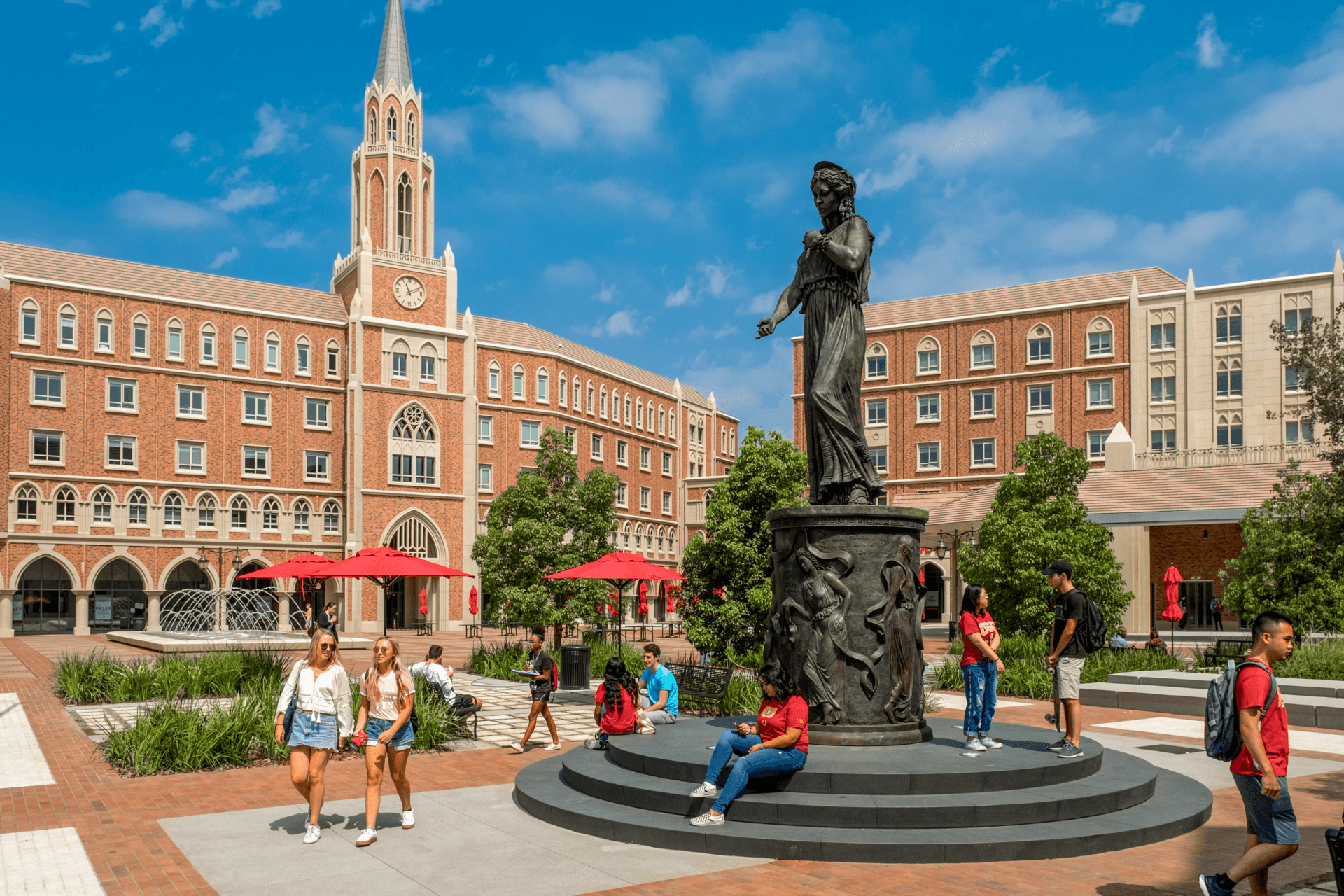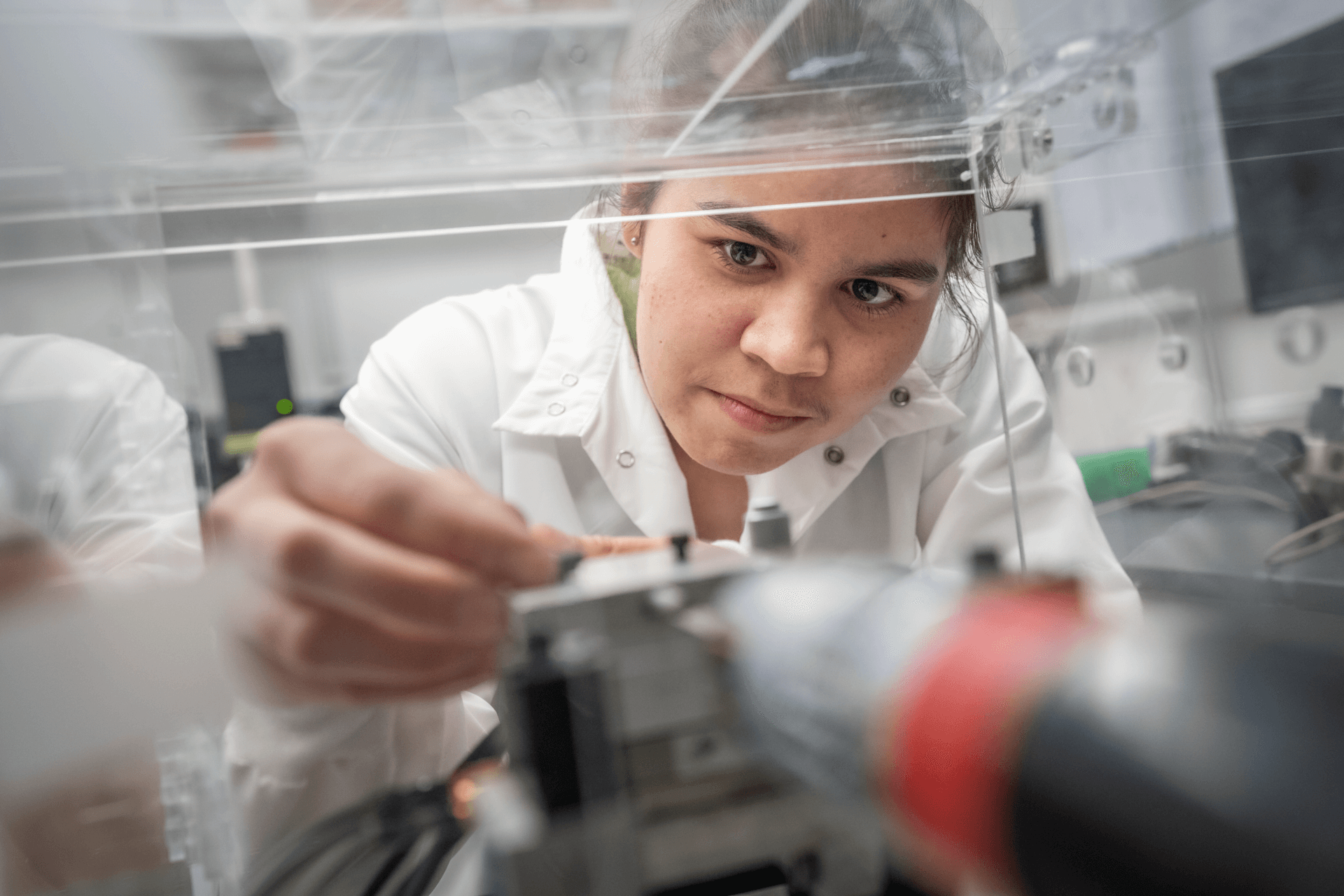- Science, Tech, Math ›
- Chemistry ›
- Chemistry In Everyday Life ›

Chemical Engineering Courses
Classes Students Are Expected to Take in College
STUDIOBOX/Getty Images
- Chemistry In Everyday Life
- Chemical Laws
- Periodic Table
- Projects & Experiments
- Scientific Method
- Biochemistry
- Physical Chemistry
- Medical Chemistry
- Famous Chemists
- Activities for Kids
- Abbreviations & Acronyms
- Weather & Climate
- Ph.D., Biomedical Sciences, University of Tennessee at Knoxville
- B.A., Physics and Mathematics, Hastings College
Are you interested in studying chemical engineering ?
Here's a look at some of the courses chemical engineering students are expected to take in college. The actual courses you would take depend on which institution you attend, but expect to take a lot of math, chemistry, and engineering courses.
You'll also study environmental sciences and materials. Many engineers take classes in economics and ethics, too.
- Computer Science
- Differential Equations
- Electronics
- Engineering
- Environmental Engineering
- General Chemistry
- Organic Chemistry
- Reactor Design
- Reactor Kinetics
- Thermodynamics
Typical Course Requirements
Chemical engineering usually is a four-year degree, requiring 36 hours of coursework. The specific requirements vary from one institution to another, so here are some examples:
Princeton's School of Engineering and Applied Science requires:
- 9 engineering courses
- 4 math courses
- 2 physics courses
- 1 general chemistry course
- 1 computer class
- 1 general biology course
- Differential equations (math)
- Organic chemistry
- Advanced chemistry
- Electives in science and the humanities
What Makes It Special?
Studying chemical engineering opens opportunities not only for engineering, but also for biomechanical science, modeling, and simulations.
Courses specific to chemical engineering can include:
- Polymer science
- Bioengineering
- Sustainable energy
- Experimental biology
- Biomechanics
- Atmospheric physics
- Electrochemistry
- Drug development
- Protein folding
Examples of areas of chemical engineering specialization include:
- Biotechnology
- Microelectronics
- Environmental engineering
- Engineering mechanics
- Materials science
- Nanotechnology
- Process dynamics
- Thermal engineering
Now that you know what courses a chemistry major takes, you may be wondering why you should consider a career in engineering. There are several good reasons to study engineering .
- Top Reasons to Study Engineering
- Chemical Engineering Jobs
- Chemistry Jokes and Puns With Explanations
- Engineering Branches List
- What Is the Importance of Chemistry?
- Common Household Chemicals That Are Dangerous Mixtures
- Recycling Composite Materials
- Best Quotes About Chemistry
- What to Do If You Are Exposed To Tear Gas
- How to Substitute for Baking Powder and Baking Soda
- Mixing Regular and Synthetic Motor Oils
- Examples of Chemical Reactions in Everyday Life
- Chemistry of BHA and BHT Food Preservatives
- Glow Stick Experiment - Rate of Chemical Reaction
- Learn About Refractory Metals
- Carbon Fiber Manufacturing Companies
Massive Open Online Courses (MOOCs)
Moocs on mitx.
At MIT, digital learning contents are not only used to augment on-campus learning, but also made available to a global audience in Massive Open Online Courses (MOOCs). Check out these current and upcoming MOOC offerings by MIT Chemical Engineering, and enroll for free!
University Catalog 2024-2025
Chemical engineering (che).
Engineering methods of treating material balances, stoichiometry, phase equilibrium calculations, thermophysics, thermochemistry and the first law of thermodynamics. Introduction to equation solving packages and spreadsheets for solving problems related to chemical engineering calculations.
Prerequisite: Grade of C or better in MA 241 , PY 205 , and ( CH 201 or CH 221 or CH 225 )
Typically offered in Fall, Spring, and Summer
Introduction of mathematical and computational tools for analyzing chemical engineering problems. Sequential modular and equation-based simulation of steady-state chemical processes using advanced spreadsheet methods and multivariate root-finding algorithms. Material and energy balances on transient processes and their solution using analytical and numerical methods. Introduction to microscopic material and energy balances using the "shell balance" approach to develop the governing differential equations. Solutions to steady-state boundary value problems in heat conduction and Fickian diffusion.
Prerequisite: C- or better in CHE 205 and MA 242 ; Corequisite: MA 341
Fundamental aspects of momentum and heat transfer, and the use of these fundamentals in solving problems in transport operations.
Prerequisite: Grade of C- or better in both CHE 225 and MA 341
Typically offered in Fall and Spring
Fundamental aspects of mass transfer and the use of these basic principles in solving problems in transport operations.
Prerequisite: Grade of C- or better in CHE 311
Laws of thermodynamics and their application to chemical engineering problems, both in theory and in practice. Criteria of equilibrium in physical and chemical changes. Behavior of real fluids, including mixtures.
Prerequisite: Grade of C- or better in CHE 225
Systematic study of chemical reaction equilibria and phase equilibria. Use of fugacity, activity and chemical potential concepts for predicting the effect of such variables as temperature, pressure on equilibrium compositions. Methods for measuring and estimating thermodynamic properties important to equilibrium calculation in real systems.
Prerequisite: Grade of C- or better in CHE 315
Laboratory experiments in unit operations of heat transfer and fluid flow. Laboratory safety, technical report writing, statistics, experimental design, error analysis and instrumentation.
Prerequisite: CHE 311
Laboratory experiments in mass transfer and reaction kinetics. Experimental planning, technical report writing and oral presentations are emphasized.
Prerequisite: CHE 312 , CHE 330
Professional development and topics of current interest in chemical engineering.
Dynamic analysis and continuous control of chemical and material engineering processes. Process modeling; stability analysis, design and selection of control schemes. Solution of differential equations using Laplace transform techniques.
Prerequisite: ( MA 341 and TE 205 ) or CHE 312
Typically offered in Spring only
Characterization and measurement of the rates of homogeneous and heterogeneous reactions. Design and analysis of chemical reactors. Credit cannot be received for both CHE 446 and CHE 546 .
Prerequisite: CHE 316
Typically offered in Fall only
Design and analysis of chemical reactors with emphasis on enzyme-catalyzed reactions, microbial fermentation, and animal cell culture. Empirical kinetics of enzymatic reactions and cell growth. Design and scale-up of suspension bioreactors. Immobilized-enzyme and immobilized-cell bioreactors, including the classical Thiele reaction-diffusion analysis.
Prerequisite: CHE 312 and CHE 316 ; Corequisite: BCH 451
This course will cover critical aspects of bioreactor design, including design of reactors for enzyme-catalyzed reactions, fermentation of microorganisms, and scale-up considerations for bioreactors. Hands-on experiments involving fermentation of microorganisms and scale-up of bioreactors will be included. Students cannot get credit for both CHE 448 and CHE 548 .
Prerequisite CHE 446 or instructor permission; Co-requisite BCH 451 or instructor permission
Applications of cost accounting, cost estimation for new equipment, manufacturing cost and measures of profitability. Use of computer simulation design and cost programs. Procedures for sizing unit operations commonly encountered in the chemical process industry. Heuristics for selection of separation processes and heat exchanger network synthesis.
Prerequisite: CHE 312 ; Corequisite: CHE 446 or CHE 447
Chemical process design and optimization. The interplay of economic and technical factors in process development, site selection, project design, and production management. Comprehensive design problems.
Prerequisite: CHE 450 , and ( CHE 446 or CHE 447 )
This course will cover modern methods in biomolecule design, including gene expression regulators, RNA structure, protein structure, and metabolic networks. Current methods in genetic engineering and 'omics-based analysis will be discussed, followed by a critical review of current literature on the applications of these methods to engineering microbes, cells, and multi-species communities. Hands-on assignments involving computational design will be included.
Corequisites: CHE 448 and BCH 451
This course is an introduction to electronic materials, chemical processes used in their fabrication, and basic physical principles of electronic device operation and function. The course will address how principles of chemical engineering are applied to design and fabricate current and emerging electronic systems. We will also discuss emerging areas of electronic technologies, including organic semiconductors, advanced energy conversion, and quantum computing and related systems. Credit for both CHE 460 and CHE 560 is not allowed.
Prerequisite: CHE 446 or permission of instructor
Concepts and techniques for polymerization of macromolecules. Structure, properties, and applications of commercially important polymers.
Prerequisite: ( CH 223 or CH 227 ) and CHE 316
Concepts of nanotechnology are applied in the synthesis, characterization, recognition and application of biomaterials on the nanoscale. Emphasis will be given to hands-on experience with nanostructured biomaterials; students will also be familiarized with the potential impact of these materials on different aspects of society and potential hazards associated with their preparation and application.
Prerequisite: MA 241 and PY 208 and ( CH 223 or CH 227 )
Students completing this course will be able to conduct small-scale fermentations of recombinant microorganisms as well as having an understanding of ways to approach optimization of such processes. One of the focus areas of this course is on protein production and factors that affect gene expression and recombinant protein yield.
P: CH 223 or CH 227 ; C: BIT 410 or BIT 510 or BCH 452 or MB 352 or MB 354 or BEC 425 or BEC 525
The first part of this course will present the fundamentals of nanoscale colloidal processes, including interactions and self-assembly of particles, surfactants and biomolecules. The applications of these fundamentals to the nanotechnology and engineering on the nanoscale will be discussed. The nanoscience has led to the development of many new technologies with relevance to chemical engineering, including microfluidics, lab-on-a-chip, bioarrays and bioassays. These emerging technologies will be presented and discussed in the second half of this course.
Prerequisite: C- or better in CHE 311 and CHE 315 .
This course is offered alternate odd years
Theoretical principles and experimental techniques associated with flow and deformation of polymer systems. Systems include: meffs and solutions, suspension, gels, emulsions, and thixotropic materials.
Conventional and emerging nano-manufacturing techniques and their applications in the fabrication of various structures and devices. Review of techniques for patterning, deposition, and etching of thin films including emerging techniques such as an imprint and soft lithography and other unconventional techniques. Electronic and mechanical properties of 0 to 3-D nanostructures and their applications in nano-electronics, MEMS/NEMS devices, sensing, energy harvesting, storage, flexible electronics and nano-medicine. Credit for both ECE/ CHE 468 and ECE/ CHE 568 is not allowed.
Prerequisite: E 304
The course discusses conventional and advanced drug delivery methods and systems and modern practices in drug delivery manufacturing.
P: CH 221 or CH 225 AND MA 131 or MA 141
Design of industrial processes which minimize or eliminate wastes. Regulations and the corporate organization of current pollution prevention efforts. Current pollution prevention research. Product life cycle analysis and the application to design of more efficient processes.
Prerequisite: PY 208 , MA 341
Design and operation of animal cell culture bioreactors for therapeutic protein production. Topics include: batch, fed-batch and perfusion bioreactors, agitation and aeration for mixing and oxygen mass transfer, bioreactor monitoring and control, optimizing bioreactor performance, single-use [disposal] bioreactors, and the production of gene therapy vectors. This is a half-semester course. Time outside of the regularly scheduled class time may be required.
Prerequisite: BEC 463 or CHE 563 or BEC 363 or BEC 440/540 or BEC 441/541 or equivalent; or consent of instructor.
Development and presentation of Honors Thesis in Chemical Engineering and discussion of graduate school selection and preparation.
Prerequisite: CHE 497 , Senior standing
Introduction to chemical engineering research through experimental, theoretical and literature studies. Oral and written presentation of reports.
Prerequisite: Junior standing
Projects in research, design or development in various areas of chemical engineering.
Dynamic analysis and continuous control of chemical engineering processes. Process modeling; stability analysis, design and selection of control schemes. Solution of differential equations using Laplace transform techniques. Credit for both CHE 425 and CHE 525 is not allowed.
Prerequisite: CHE 312
This online/hybrid chemical engineering bridging course is part of a comprehensive two-course sequence (three credits each) consisting of core undergraduate level chemical engineering topics. This homework-intensive course is designed to prepare students with backgrounds in chemistry, biology and other non-chemical engineering subjects for graduate study in chemical engineering. It is not equivalent to a four-year degree in chemical engineering, but the proposed course is designed to help students obtain the additional knowledge and skills to successfully undertake graduate classes offered by a chemical engineering program.
Prerequisite: Graduate Standing
Typically offered in Spring and Summer
Prerequisite: CHE 223, CHE 316
Typically offered in Fall and Summer
This course is offered alternate years
Characterization and measurement of rates of homogeneous and heterogeneous reactions. Design and analysis of chemical reactors. Credit for both CHE 446 and CHE 546 is not allowed.
Enzyme and microbial kinetics and reactor designs for processes involving enzymes and single and mixed cultures. Samples drawn from full range of applications: food processing, single cell proteins, tissue culture and vaccines, monoclonal antibodies, recombinant DNA and hybridomas, artificial organs, biological waste treatment and environmental processes.
Prerequisite: CHE 312 and ( CHE 446 or CHE 447 )
Overview of biomanufacturing using microorganisms (bacteria, yeast, fungi), eukaryotic cells (hybridomas, insect, plant, CHO) and recombinant enzymes focusing on methods used in industry. Course will emphasize process design for optimization of heterologous protein expression, metabolic/cell line engineering, metabolomics, protein engineering to alter enzymes and antibodies. Pathway engineering strategies include developing microbes to produce new therapeutic compounds or overproduce primary metabolites, antibiotics, biotherapeutics, therapeutic enzymes, diagnostics, recombinant vaccines, and biopharmaceuticals. Utilization of immobilized biocatalysts, and microbial kinetics are covered.
Graduate standing in engineering or life-science graduate program
Independent study of some phase of chemical engineering or related field.
Prerequisite: Graduate standing
Weekly seminars on topics of current interest given by resident faculty members, graduate students and visiting lecturers.
Teaching experience under the mentorship of faculty who assist the student in planning for the teaching assignment, observe and provide feedback to the student during the teaching assignment, and evaluate the student upon completion of the assignment.
Prerequisite: Master's student
For students in non-thesis master's programs who have completed all credit hour requirements for their degree but need to maintain full-time continuous registration to complete incomplete grades, projects, final master's exam, etc. Students may register for this course a maximum of one semester.
For students in non-thesis master's programs who have completed all other requirements of the degree except preparing for and taking the final master's exam.
Instruction in research and research under the mentorship of a member of the Graduate Faculty.
Thesis research.
For graduate students whose programs of work specify no formal course work during a summer session and who will be devoting full time to thesis research.
Typically offered in Summer only
Prerequisite: Graduate standing in CHE
For students who have completed all credit hour requirements and full-time enrollment for the master's degree and are writing and defending their thesis.
Introduction to graduate research guidelines and practices. Topics include research ethics, electronic literature searching, research proposal structure, technical writing styles, research problem identification, advisor expectations, intellectual property and patents, laboratory notebooks, proposal creation and oral presentation. Graduate standing in chemical engineering or permission of instructor.
Preparation of a professional quality chemical engineering research proposal. Includes selecting a novel research topic, drafting and finalizing the proposal according to NSF formats, and orally presenting and defending the proposal to a faculty advisory committee. Ethics in proposal preparation.
Prerequisite: CHE 701
Applications of methods of mathematical analysis to formulation and solution of problems in transport phenomena, process dynamics and chemical reaction engineering.
Prerequisite: ( CHE 312 , MA 301 or MA 341 ) or equivalent
In-depth coverage of chemical engineering thermodynamics principles. Application of non-ideal fluid-phase chemical potentials to problems in phase and chemical reaction equilibria. Relations of molecular structure and intermolecular forces to macroscopic thermodynamic properties.
Prerequisite: CHE 316 or equivalent
A theoretical unified study of transport of momentum, energy and matter. Introduction to diffusional operations including coupled heat and mass transfer in light of the theory.
Prerequisite: CHE 311 or equivalent
Rates and mechanisms of homogeneous and heterogeneous reactions. Design, analysis and scale-up of batch and continuous chemical reactors.
Prerequisite: CHE 446 or CHE 447 or equivalent
Topics relating to design, analysis and operation of homogeneous and heterogeneous chemical reactors.
Prerequisite: CHE 717
Electrochemical thermodynamics, electrochemical kinetics and catalysis, coupled charge and material transport in an electric field and electrophoretic effects. Design and analysis of electrochemical reactors. Survey of electrochemical industry.
Prerequisite: CHE 715 , 717
Definition and engineering analysis of major bioseparation techniques useful in product isolation and purification. Solid-liquid separation, crystallization, filtration, extraction, chromatography, membrane processes, distillation, drying, combined operations and process economics.
Prerequisite: CHE 721 or CHE 551
Thermodynamics, morphological characteristics and properties of multiphase polymer systems composed of homopolymers or copolymers. Interfacial characteristics and modification of multicomponent polymer blends through emulsification and reactive blending. Microphase ordering in block copolymers, and emerging technolgies employing these nanostructured materials. Conformational properties and dynamics of macromolecules constrained near an interface.
Prerequisite: CHE 316 or MAT 301
Current methods for modeling liquids, soft matter (polymers, surfactant solutions, colloids, liquid crystals, etc), nano-structured materials (nanoparticles, nano-composites, nano-porous materials, etc.), biomolecular systems, and reacting systems at the electronic, atomistic, meso-scale and continuum levels. Graduate level thermodynamics and differential and integral calculus required.
Prerequisite: Graduate level thermodynamics, and differential and integral calculus
This course is offered alternate even years
Directed reading of chemical engineering literature, introduction to research methodology, and lectures and seminar discussion on topics which vary from term to term.
Prerequisite: Doctoral student
For students who are preparing for and taking written and/or oral preliminary exams.
Dissertation research.
For students who have completed all credit hour, full-time enrollment, preliminary examination, and residency requirements for the doctoral degree, and are writing and defending their dissertations.
Print Options
Send Page to Printer
Print this page.
Download Page (PDF)
The PDF will include all information unique to this page.
2024-2025 Undergraduate Catalog
A PDF of the entire 2024-2025 Undergraduate catalog.
2024-2025 Graduate Catalog
A PDF of the entire 2024-2025 Graduate catalog.
Chemical Engineering
A college degree in chemical engineering focuses on designing and developing chemical manufacturing processes. For example, designing ways to make medicine for diabetics or creating a new type of stain-resistant fabric.
For this major you’ll take lots of chemical engineering classes. But you’ll also need to take classes in the arts, science, math, and social sciences to earn your bachelor’s degree. These extra courses help make sure that you graduate from college with all of the skills you’ll need to prepare for a successful career as a chemical engineer.
Chemical Engineering Courses:
- Introduction to Chemical Engineering
- Fluid Mechanics
- Thermodynamics of Single-Component Systems
- Heat and Mass Transfer
- Chemical Engineering Laboratory
- Chemical Engineering Computer Methods
- Thermodynamics of Multi-Component Systems
- Chemical Engineering Reactor Design
- Chemical Engineering Materials Technology
- Separation Processes
- Corrosion Control
- Chemical Engineering Design
- Automatic Process Control
- Chemical Process Safety
General Curriculum Requirements
- Arts Courses: Art, History, Languages, Literature, Music
- Math Courses: Algebra, Calculus, Computer Science, Logic, Statistics
- Natural Sciences Courses: Astronomy, Biology, Chemistry, Environmental Science, Physics
- Social Sciences Courses: Anthropology, Economics, Government, Psychology, Sociology
Watch this video overview to learn if majoring in chemical engineering might be right for you.
“I am studying chemical engineering, and I chose this major because I’m really passionate about energy storage devices and developing them so they don’t pollute the environment, and to help make more sustainable societies.”
“My major is chemical engineering. I picked my major because I already knew I was into chemistry a while ago. And then my high school physics teacher actually came up to me and said I should be an engineer just because I can apply things to the outside world. And engineering is more about that.”
Related Careers
- Petroleum Engineer
- Chemical Engineer
Privacy Overview
How to Become a Chemical Engineer
- Chemical engineers work in nearly every industry, turning raw materials into products.
- A bachelor’s in chemical engineering provides the education you need to enter this field.
- Choose relevant concentrations like biochemical, environmental, pharmaceutical, or fuel.
- Earn your professional engineer license and supervise your fellow chemical engineers.
In the 20th century, chemical engineering focused on the production of chemicals. As the discipline merged with biology, this engineering field expanded to producing plastics, consumer products, fuels, medicine, foods, and environmental solutions.
Today, chemical engineers work in just about every industry, using science and engineering concepts to turn raw materials into products that improve the quality of our lives.
What Is Chemical Engineering and What Do Chemical Engineers Do?
Chemical engineering entails using math, physics, chemistry, and biology to design and improve materials, equipment, and products. By converting raw materials into useful products, these professionals can minimize costs and maximize productivity while maintaining or increasing the quality of goods and materials.
Chemical engineers work in nearly every sector, including pharmaceutical, consumer products, biotechnology, manufacturing, materials, medicine, aerospace, automotive, and fuel.
Chemical engineering entails using math, physics, chemistry, and biology to design and improve materials, equipment, and products.
As a chemical engineer, you may improve food production techniques, increase access to clean drinking water, develop new fibers for clothing, recover and refine fuels, come up with solutions to environmental issues, or improve the diagnosis and treatment of diseases.
Typical duties performed in chemical engineer jobs include research and testing, designing and evaluating equipment and processes, and ensuring compliance with safety and environmental regulations.
Chemical Engineer Job Demand and Salary
The Bureau of Labor Statistics (BLS) projects 4% job growth for chemical engineers between 2019 and 2029, about as fast as the average employment growth rate for all occupations. Industries like alternative energy and biotechnology should experience sustained demand, while traditional manufacturing positions may see some decline.
Because of the rapid advances in technology, engineers must stay informed of emerging trends in their field and industry. Some of the top industries employing chemical engineers include chemical manufacturing, architecture and engineering, scientific research, petroleum and coal product manufacturing, and the federal government.
Industries like alternative energy and biotechnology should experience sustained demand for chemical engineers, while traditional manufacturing positions may see some decline.
The states employing the most chemical engineers include Texas, California, New Jersey, Louisiana, and Ohio. Texas also offers the highest earnings for these professionals, with an average annual chemical engineer salary of $138,600 in 2020, according to the BLS.
While annual salaries vary depending on position, location, and employer, the BLS reports that chemical engineers earned a median annual salary of $108,540 in 2020. Engineers who work for petroleum and coal product manufacturers boast even greater earnings, with a median annual salary of $123,360.
Step by Step: How to Become a Chemical Engineer
To become a chemical engineer, you should gear up in high school by taking courses in science and math, particularly calculus. From there, you will need a bachelor’s degree in chemical engineering, preferably from a college that offers concentrations in your field of interest. If you’re interested in management opportunities, a master’s may be required.
Step 1: Study Chemistry, Physics, and Math in High School
Chemical engineering applicants face stiff competition. As a high school student, you should start preparing early in your studies by taking classes in chemistry, biology, physics, and math.
Taking college preparatory or AP courses in these areas may also increase your chances of admission, and specific coursework in trigonometry, algebra, and calculus can prepare you to meet college admission requirements.
You can also benefit from extracurricular activities in science, technology, engineering, and math . Many universities and research centers offer engineering summer camps and the opportunity to perform research.
Step 2: Earn a Bachelor’s Degree in Chemical Engineering
To become a chemical engineer, you need a bachelor’s degree in chemical engineering. You should also consider attending a program accredited by the Accreditation Board for Engineering and Technology (ABET). This accreditation lets employers and educators know that you have received a rigorous education and meet the quality standards of the profession. This accreditation also qualifies you to pursue licensure in some states.
Most chemical engineering bachelor’s programs require 120-130 credits and take about four years of full-time study to complete. You’ll learn about analysis and invention of chemical products and processes through classroom, laboratory, and field studies. You’ll also explore how to design equipment and processes for manufacturing.
Some programs offer internships or cooperative education experiences that will allow you to gain the experience many employers require.
Schools offer several concentrations that allow you to focus on your area of interest, including the following:
Admission Requirements
- Minimum GPA : 3.0-3.5
- Academic Requirements : Many programs recommend four years of science, including one year of physics and one year of chemistry, and successful completion of a college-level calculus course
- ACT/SAT Scores : Currently, many schools are not requiring these test scores
Typical Courses
- Calculus and Analytic Geometry
- Polymer Science and Technology
- Physical Chemistry
- Biochemistry
- Chemical Process Thermodynamics
- Momentum and Heat Transfer Operations
- Material Science and Engineering
- General Physics
- Chemical Reaction Engineering
Step 3: Consider a Master’s Degree in Chemical Engineering
While you can pursue a lucrative rewarding career as a chemical engineer with a bachelor’s degree, an advanced degree paves the way to additional job opportunities. In addition to qualifying for managerial positions, a master’s degree provides a deeper understanding of chemical reactions, independent research methods, and advanced laboratory skills. A career in research or academia typically requires a master’s.
Some schools offer engineering programs that allow you to complete your combined bachelor’s and master’s degrees in chemical engineering within five years.
- Minimum GPA : 3.0
- Academic Requirements : Many programs require four years of mathematics through differential equations and several classes in organic and physical chemistry
- Degree Requirements : Bachelor’s degree in engineering or a physical science
- GRE Scores : Currently, many schools are not requiring these test scores
- Transport Phenomena
- Advanced Thermodynamics
- Kinetics and Applied Math
- Advanced Chemical Reaction
- Fluid Mechanics
- Microhydrodynamics
Step 4: Establish State Licensure
Unlike other engineering disciplines , many positions as a chemical engineer do not require a license. In fact, many of these engineers do not pursue licensure their entire career.
On the other hand, earning a professional engineer (PE) license may be required for some management positions or if you’re considering going into private practice. This license enables chemical engineers to supervise other engineers, prepare and submit engineering plans to a public authority, and sign off on projects.
Obtaining your PE license requires time and commitment. While not required, going the extra mile sets you apart from your fellow engineers and lets employers know you’ve gone through rigorous training.
Step 5: Gain Practical Experience in the Field
Many bachelor’s in chemical engineering programs offer internships or cooperative education experiences. These programs generally provide you with several months of field experience and the practical knowledge valued by most employers.
Most entry-level jobs provide on-the-job training. Newcomers usually work under an experienced engineer and may receive additional training at seminars. As you gain more experience, you’ll find increasing job responsibilities and greater independence.
Step 6: Become a Professional Engineer in Chemical Engineering
Pursuing your PE license can increase your career opportunities, particularly in supervisory roles. Without this license, you may work under a supervisor who has earned a PE license.
While each state issues its own license, most have similar requirements and recognize licensure from other states. You need a degree from an ABET-accredited engineering program, a passing score on two national licensing exams, and experience.
Related Pages
Feature Image: kali9 / E+ / Getty Images
What Chemical Engineers Do and How to Become One
Chemical engineering jobs focus on making chemistry-based products safely, quickly and inexpensively.

How to Become a Chemical Engineer

Getty Images
Chemical engineers can work at water desalinization and sanitation facilities.
Many of the mass-produced items ordinary people encounter and utilize regularly – ranging from cosmetics, electronics and fuel to plastics, medicines and processed foods – could not have been created in bulk at factories without the assistance of chemical engineers.
"Chemical engineers are many times tasked with bringing to life something that is just an idea," Brandon Webster – a senior chemical engineer at Battelle, a global research and development firm – wrote in an email. "Without chemical engineers product development would be phenomenally slow and the products (electronics, food systems, energy, anything plastic, paper/pulp, pharmaceuticals) would be much less efficient and in some cases would not exist."

Chemical Engineering Careers: What Chemical Engineers Do in the Workforce
Chemical engineers work in many industries, including not only the petrochemical and pharmaceutical industries – two areas where they are often employed – but also numerous other industries which involve building and selling tangible objects, such as beverages, clothing, fertilizers, paper, toys and shoes. They can also work at water desalinization and sanitation facilities, and they can be employed by recycling plants.
"Over 50% of global gross domestic product is enabled by chemical engineers," Sean Hunt, chief technology officer and co-founder of the Solugen technology firm, wrote in an email.
"Simply put, chemical engineers convert Earth's natural materials into the products we use every day," added Hunt, who has a bachelor's, master's and Ph.D. in his field.
Chemical engineers design and set up whatever manufacturing plant systems are necessary to churn out purified substances, combine recipe ingredients and dispose of hazardous waste. These engineers occasionally choose the elements and compounds that are used to make an object with particular qualities such as the ability to conduct electricity or to tolerate heat. They analyze the atomic and molecular composition of whichever solids, liquids and gases an organization is using in order to determine how those materials should be handled and develop strategies for minimizing environmental pollution. One of their key tasks is to ensure that every chemical-infused product is nontoxic and that it works properly before it reaches a consumer. Another aspect of their mission is to protect factory workers from poisons and prevent accidental explosions.
Chemical engineering is a lucrative profession where a bachelor's degree can lead to a six-figure salary. According to the U.S. Bureau of Labor Statistics, the median annual salary reported by U.S.-based chemical engineers in May 2020 was $108,540, and the typical entry-level credentials for this occupation are a college degree in either chemical engineering or a related academic discipline plus a relevant internship or co-op experience.
André Taylor, associate professor of chemical and biomolecular engineering at New York University's Tandon School of Engineering , says the role of a chemical engineer differs from that of a chemist.
Taylor – who has bachelor's, master's and Ph.D. in chemical engineering – compares chemists to cake-bakers who figure out how to make a cake. "The chemical engineer is a plant designer, so the chemical engineer can say, 'OK, this chemist can bake this cake. How do I take this where I can mass-produce this?' So if I wanted to make 100 cakes or a thousand cakes per hour, then what is the equipment that is involved to make the same quality of that same unique cake? Or, if I want to scale up that cake and make it super big – maybe with a 10 foot diameter – what are the things I need to do, what kind of equipment do I need ... to make that cake bigger and yet still have the same properties?"
The Skills, Classes and Hands-On Training Necessary for Chemical Engineering
Chemical engineering is a field where the ability to predict potential catastrophes and prevent disaster is essential, according to chemical engineers, who note that this is an area which requires problem-solving skills.
Creativity is also mandatory for this profession, chemical engineers say, emphasizing that they are frequently asked to figure out how to perform difficult tasks. They add that aptitude for, interest in and advanced training in math and science is a must within their profession, which is extremely technical.
Christi Luks, associate chair for academic affairs with the Missouri University of Science and Technology , says a bachelor's degree is sufficient for most chemical engineering positions, though a graduate degree may be beneficial for some jobs.
Faculty within chemical engineering programs acknowledge that their curriculum is demanding and suggest that completion of these programs requires persistence, since it requires passing a variety of difficult classes in mathematics, basic sciences and applied sciences.
Luks – who earned a bachelor's degree in chemical engineering, a master's degree in applied math and a Ph.D. degree in chemical engineering – says any high school student who intends to become a chemical engineer someday should be sure to strengthen his or her abilities in math, even if the introductory coursework in that area seems dull at first. "It turns out that if you've got good math skills, you can solve some way cool problems," she explains, noting that one of her students used the calculation abilities he cultivated in her course to distill alcohol.
Andrew Zydney, a professor of chemical engineering with an endowed faculty post at Pennsylvania State University , notes that chemical engineers were involved in creating monoclonal antibodies used in cancer treatments and also helped with the development of coronavirus vaccines; he notes that these engineers also assist with the production of lightweight, fuel-efficient vehicles
A quantitative mindset is valuable for a future chemical engineer, adds Zydney, who has both a bachelor's and Ph.D. in chemical engineering. "They should be comfortable solving problems where the goal is to come up with a number as the answer as opposed to just a qualitative description," he suggests.
Brian Marshall, a senior process and environmental engineer with Guernsey – a professional service company – who has a bachelor's degree in chemical engineering from the University of Oklahoma , notes that there are often a variety of chemical engineering positions within the same industry. For example, within the oil and gas industry, some chemical engineers focus on drilling and extracting substances while others focus on transporting those chemicals and pumping them through pipes, mitigating environmental risks or refining materials, he explains.
Jacob Borden, an associate professor of chemical engineering at Trine University in Indiana, contends that chemical engineers tend to be practical.
"Most people would think that chemical engineers have a love of chemistry, and that's true. But a chemical engineer truly loves what chemicals can do way more than the chemical itself," says Borden, who has bachelor's and master's degrees in chemical engineering and a Ph.D. degree that focuses on both biological and chemical engineering.
According to Borden, the "foundation" of a chemical engineering degree is coursework in math and a variety of science disciplines including not only a significant amount of chemistry but also biology, materials science and physics. "Above the foundation there is a lot of time spent on processing – processing data, managing projects, using engineering software and using the equations inherent to the art of chemical engineering to answer a question or solve a problem," he says. "From an education standpoint, the best outcome for a student is not to appreciate yesterday's solution, but to have the tools to solve the problems that remain unsolved."
Searching for a grad school? Access our complete rankings of Best Graduate Schools.
10 Majors With Highest Starting Salaries

Tags: engineering , students , education , graduate schools , colleges , chemistry
You May Also Like
Gap year jobs for law school applicants.
Gabriel Kuris Dec. 9, 2024

Engineering Grad Schools with Most Women
Cole Claybourn Dec. 5, 2024

7 Sins of Business School Applicants
Anayat Durrani Dec. 3, 2024

Colleges With Microbreweries on Campus
Cole Claybourn Dec. 3, 2024

Tips for Med School Applicants' Parents
Kathleen Franco, M.D., M.S. Nov. 26, 2024

Law Applicants and Disciplinary Issues
Gabriel Kuris Nov. 25, 2024

Primary Care vs. Research Med Schools
Anna Fiorino Nov. 21, 2024

Do Law Schools Accept Associate Degrees?
Gabriel Kuris Nov. 18, 2024

Is Law School Worth the Price?
Ilana Kowarski and Cole Claybourn Nov. 12, 2024

Tips for Foreign Law School Applicants
Gabriel Kuris Nov. 12, 2024


- University of Southern California
- Viterbi School of Engineering
Bachelor of Science in Chemical Engineering
Transformations to solve our most pressing issues
About this program.
Chemical Engineering is the only engineering discipline that makes extensive use of chemical transformations (i.e. reactions) in addition to physical transformations (such as machining and molding) to achieve added value. Thus, chemical engineers are employed in virtually all manufacturing industries, from the basic chemical, materials, energy, food, pharmaceutical and microelectronics industries to the myriad consumer product industries, because all manufacturing involves chemical transformations in one way or another. This means that chemical engineers must be very broadly educated and trained, as well as highly adaptable.
Students in the BS in Chemical Engineering program can choose between a primary degree in Chemical Engineering with no added specialization, or choose between four emphasis programs: Biological & Pharmaceutical, Energy & Sustainability, Materials and Petroleum & Subsurface.
- BS Chemical Engineering
Biological & Pharmaceutical
Energy & sustainability, petroleum & subsurface, application deadlines, early action: november 1, regular decision: january 15, hear from our students.

What is day-to-day like as a USC Engineering Student?

What will I do as a Chemical Engineering Major?

What are concentrations and how to choose one?
Meet our faculty.

Dr. Noah Malmstadt

Dr. Malancha Gupta

Dr. Nick Graham

Dr. Shaama Sharada

Dr. Wade Zeno

Dr. Luis Francisco Villalobos
Hear from our faculty, listen to the podcast and lean more about our program, ready to apply | click here.
- Events Calendar
- Media Coverage
- MFD Job Openings
- MFD Advisory Board
- Lyman Handy Colloquia
- Distinguished Lectures
- Pings Keynote
- Spitzer Keynote
- Graduate Seminars
- Creating Sustainable Cities and Responsible Energy Sources
- Improving Health and Wellness
- Harnessing Data Science and Machine Learning
- Designing Quantum Materials and Systems
- Developing Advanced Materials and Manufacturing Methods
- MFD Faculty Directory
- Alumni & Friends
- Chemical Engineering
- Materials Science
- Energy Engineering
- Petroleum Engineering
- General Advising
- Undergraduate Advising
- Master’s Advising
- PhD Advising

IMAGES
VIDEO
COMMENTS
Chemical engineering usually is a four-year degree, requiring 36 hours of coursework. The specific requirements vary from one institution to another, so here are some examples: Princeton's School of Engineering and Applied Science requires:
Learn Chemical Engineering, earn certificates with paid and free online courses from Stanford, MIT, IIT Madras, UC Davis and other top universities around the world. Read reviews to decide if a class is right for you.
Chemical engineering requires a foundational knowledge in chemistry, biology, physics, and mathematics. From this foundation, chemical engineers develop core expertise in thermodynamics, transport processes, and chemical kinetics. ... The Chemical Engineering program (Course 10) is accredited by the Engineering Accreditation Commission of ABET ...
Check out these current and upcoming MOOC offerings by MIT Chemical Engineering, and enroll for free! 10.S95x Physics of COVID-19 Transmission Learn about the scientific principles behind the airborne transmission of COVID-19, and how quantitative safety guideline may be derived to assess the risk of transmission.
This online/hybrid chemical engineering bridging course is part of a comprehensive two-course sequence (three credits each) consisting of core undergraduate level chemical engineering topics. This homework-intensive course is designed to prepare students with backgrounds in chemistry, biology and other non-chemical engineering subjects for ...
all of the core chemical engineering coursework, plus a chosen set of three foundational concept subjects and four subjects with engineering content that make up a comprehensive concentration specic to the interdisciplinary area selected by the student. The
For this major you'll take lots of chemical engineering classes. But you'll also need to take classes in the arts, science, math, and social sciences to earn your bachelor's degree. These extra courses help make sure that you graduate from college with all of the skills you'll need to prepare for a successful career as a chemical engineer.
Nuclear Engineering: This specialization teaches you about the many facets of nuclear power, including the design, development, and maintenance of these power plants.; Nanomaterials Engineering: This concentration introduces you to the world of very small chemical substances and ultra-fine particles ranging from 1-100 nanometers.This rapidly advancing field of engineering is producing big ...
Chemical engineering jobs focus on making chemistry-based products safely, quickly and inexpensively. ... the "foundation" of a chemical engineering degree is coursework in math and a variety of ...
Bachelor of Science in Chemical EngineeringTransformations to solve our most pressing issuesAbout This ProgramChemical Engineering is the only engineering discipline that makes extensive use of chemical transformations (i.e. reactions) in addition to physical transformations (such as machining and molding) to achieve added value. Thus, chemical engineers are employed in virtually all ...